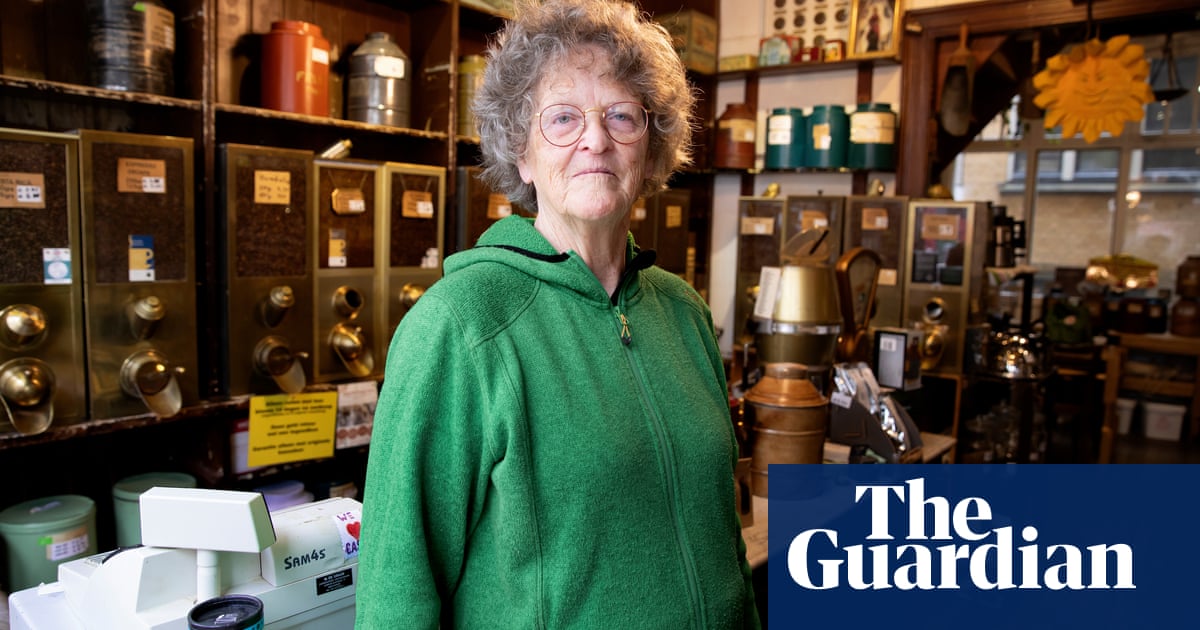The floral perfume of tea and coffee fills the air in ‘t Zonnetje (The Sun), as – behind the counter – Marie-Louise Velder weighs out loose leaf tea, parcelling black leaves into paper packets. Mahogany-coloured shelves are stacked with pots containing beans from Ethiopia, Java, India, alongside bric-a-brac, such as vintage tea tins and old master-style pictures.
But in less than two months, the sun will set for good on this cosy shop in Amsterdam, which was founded in 1642. For the owner, the rent is just too high.
Velder, an energetic 76-year-old, who took over the business 26 years ago from an English family, paid 975 guilders (about €440 or £376) rent a month in 1999. Now she expects a monthly bill of up to €4,500, backdated to last September, after a legal dispute with her landlord. That was reduced from €6,000 by an independent arbiter, but still represents a hefty increase on the €3,000 she pays now.
“It makes me sick, that’s all I can say,” she said over a cup of Ceylon tea. Traditional shops, she said, “are all dying” because of soaring rents.
Since the Amsterdam-based newspaper Het Paroolrevealed the closure last week, she said she had received a huge response from customers – “love, only love”.
As another independent shop closes, fears are growing that the city will be increasingly dominated by chain stores and shops catering to tourists.
Johannes Wilhelm, a 63-year-old local businessman, who had cycled over for some lapsang souchong, described ‘t Zonnetje’s imminent disappearance as a real pity. “There are a lot of cheese and Nutella-pancakes and all kinds of tourist shops. Tourists are fine [and] good. But this should be here as well,” he said.
Rents have been growing in the “most sought after high street retail locations” across the Netherlands, according toone market analyst.
Although the future of the shop site is uncertain, Karel Loeff, the director of the conservation organisation Heemschut, has observed that higher rents tend to mean bigger companies with more standardised offers move in when sole traders move out.
Founded in 1642, the shop on Haarlemmerdijk began by selling herbs, coal and buckets of water, but as the Dutch empire prospered it offered tea and coffee.
In the modern shop, Velder makes Earl Grey in the chilly basement by steeping Assam leaves in bergamot for three days, a blend that took two and a half years to perfect. She once sold 350 varieties of tea, but her offer is sharply reduced as she runs down her stock.
Loeff said preserving living heritage – one of the aims of Heemschut – was very hard.
“We can preserve the wooden beams and shelves … but we can’t preserve a function. We can’t say this is an original tea shop and you should preserve this for the future.”
Local shops run by private owners for decades “are what make cities unique”, he continued. “If you push them away and you only have standard brands and shops, the attractiveness of the city disappears.”
Amsterdam has been grappling for years with how to preserve its heritage in the face of increasing numbers of homogenous chain stores and tourist-friendly novelty shops selling sweets or rubber ducks in the historic centre. In 2017, the city government announced that retailers catering mainly to tourists, such as bike-rental companies or cheese shops,would be prevented from openingin parts of the city centre.
Iris Hagemans, an urban geographer at Amsterdam University of Applied Sciences, cautioned about generalising. Amsterdam has places where tourism has created a “monoculture in the shopping landscape”, she said, citing the congested central Damstraat. But just a few hundred metres away “the atmosphere is completely different” and shops confronted with dwindling demand from residents and competition from online shopping are benefiting from tourist footfall. “I think this monoculture is sometimes portrayed as a kind of oil spill that will eventually spread throughout the city, but the effect is much more local.”
Government support for independent businesses, such as intervention to control commercial rents, was a tricky area, she said. “There can be quite a big gap between the type of shops that people claim to want to see in their neighbourhood and … the kind of shop that they actually frequent … I think there’s a risk there of supporting a function for which there is not really a demand.”
Hagemans favours government action to protect basic needs, such as access to healthy food, healthcare and other essential services, but cautions against the state as an arbiter of taste. “The retail landscape should be able to respond to the market and be dynamic. And it’s democratic in the way that you vote with your wallet.”
Down the road from ‘t Zonnetje, near a pizza joint and lemonade shop, a banner has gone up tomark the 750th anniversary of Amsterdam, which falls in October. Velder has heard there are plans afoot to support small business owners in this anniversary year, “but it is too late for me”.
